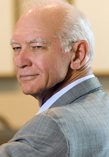© 2017 The Texas Lawbook.
By Jeff Bounds
(May 1) – To slay Goliath, David needed a sling, a stone and good aim. For Sam Baxter, the task was akin to herding cats.
The principal at McKool Smith led a trial team in Marshal that last week won an antitrust verdict of more than $43 million against General Electric, the Boston-based conglomerate whose $250 billion-plus market value is one of the highest in the U.S.

The Davids in this case were 17 mom-and-pop companies from outside Texas who claimed GE was improperly preventing them from providing low-cost competition in fixing and maintaining anesthesia machines that GE makes.
Some seven of the plaintiffs also made similar claims about GE’s alleged anti-competitive conduct in the market for selling and maintaining older GE machines that businesses like those plaintiffs refurbish.
“Most of them have two to four employees,” Baxter says of his 17 clients. “They were coming from throughout the country, including both coasts. They’re not accustomed to dealing with litigation.”
But deal with it they did. All 17 landed total awards from the 8-member jury ranging from $50,476 (for Medina, Ohio-based Anesthesia Specialists) to more than $12.18 million (Asheville, N.C.-based Metropolitan Medical Services of NC.)
Assuming the verdict holds up through likely post-trial motions and appeals, that amount will be tripled in accordance with federal antitrust law.
Baxter says he expects the federal district judge in the case, Robert Schroeder III, to start receiving defense motions “any time now.”
The GE trial team was led by Matthew Wolf, a Washington D.C.-based partner at Arnold & Porter Kaye Scholer. John “Trey” Cox, a Dallas-based partner at Lynn Pinker Cox Hurst, headed GE’s local legal efforts.
“GE values appropriate market access to our life-saving technologies,” said a spokesperson for GE Healthcare, the unit that the anesthesia-machine business is part of. “Although we are disappointed by the verdict, we stand by our values and plan to appeal the decision.”
Long-standing issues
The roots of the controversy go back long before McKool received the cases through a pair of referrals. In 1984, the corporate predecessor to GE’s anesthesia operations, Datex-Ohmeda, stopped selling 12 percent of its parts to independent service businesses, including some of the plaintiffs in the GE litigation, according to court records.
At the time, Datex-Ohmeda controlled roughly 70 percent of the U.S. market for anesthesia gas machines. (The plaintiffs maintain GE controls 70-plus percent of the relevant markets in the current fight, while GE puts its share at less than 50 percent.)
Through the mid-1990s, small service businesses could neither get parts on Datex-Ohmeda’s “restricted” list, nor obtain service manuals nor send their technicians to the company’s training schools, court records say.
Several small service businesses sued in November 1996, alleging Datex-Ohmeda illegally used its monopoly over parts for anaesthesia machines to force customers to buy its servicing, court records say.
Datex-Ohmeda in mid ’97 agreed to open its training to outside service technicians, with graduates eligible to buy machine parts and service manuals. The lawsuit later settled, court records say.
GE bought Datex-Ohmeda’s corporate parent in 2003. But with a series of actions that began in 2011, GE wound up getting into a new battle with some of the small service providers.
For instance, through an exclusive arrangement with a company called Alpha Source, GE made their anesthesia machine parts available to outside providers—but at 18 to 20 percent more than list price.
GE itself sold the same parts directly to customers at list price or even a bit less, Baxter says.
GE maintained that it appointed Alpha Source, in part, because the plaintiffs were “abusing GE’s warehousing and logistics services,” which pushed “substantial management costs” onto GE, according to court records.
One of the small service firms that participated in the ‘90s litigation, Pennsylvania-based Red Lion Medical Safety, wound up in McKool Smith’s office after they were referred by Beaumont attorney, Paul “Chip” Ferguson. Red Lion had been referred to Ferguson by Paul Bartlett, a San Antonio lawyer who had had worked on the earlier litigation.

Ferguson served as co-counsel to the eight McKool lawyers in the recent trial.
Aside from the logistical and procedural hassles associated with 17 clients, McKool Smith had to cope with time limits the Eastern District of Texas imposes on each side’s case during trials.
“We ended up with something like 45 seconds left,” Baxter says.

Jennifer Truelove, a principal in McKool’s Marshal office, used her background prosecuting child-abuse cases in Harrison County to help McKool clients prepare for the uncertainties of testifying in court.
McKool associates Colleen Bloss and Dana Vallera handled some of the examinations, Baxter says, as part of an agreement between the opposing trial teams to give their young lawyers courtroom experience.
“Both of these young [women] are smart and can talk in court,” Baxter says of Bloss and Vallera.
“They just confessed”
A pivotal moment in the case came during Baxter’s examination of a GE official about a GE requirement that made it virtually impossible for small service firms to get training for their technicians to work on GE anesthesia machines.

GE required outside servicers to receive “endorsement letters” from hospitals that restricted the smaller firms to work with that facility or its network exclusively.
“Our guys can’t do that. They work with 10 to 15 hospitals,” Baxter says.
During Baxter’s questioning, a GE official initially downplayed the requirement, but then said it did, in fact, force the servicer to work only with that client.
After a courtroom break, the GE official admitted on the stand that the language in the contract was confusing, and announced that the company would change it.
“They didn’t read it beforehand,” Baxter says. “In my 47 years as a lawyer, I’ve never seen that. We said, ‘They just confessed.’ The jury apparently agreed with us.”
For Baxter, the exchange called to mind the famed television series that inspired generations of trial lawyers.
“It was a Perry Mason moment,” Baxter says.
© 2017 The Texas Lawbook. Content of The Texas Lawbook is controlled and protected by specific licensing agreements with our subscribers and under federal copyright laws. Any distribution of this content without the consent of The Texas Lawbook is prohibited.
If you see any inaccuracy in any article in The Texas Lawbook, please contact us. Our goal is content that is 100% true and accurate. Thank you.
